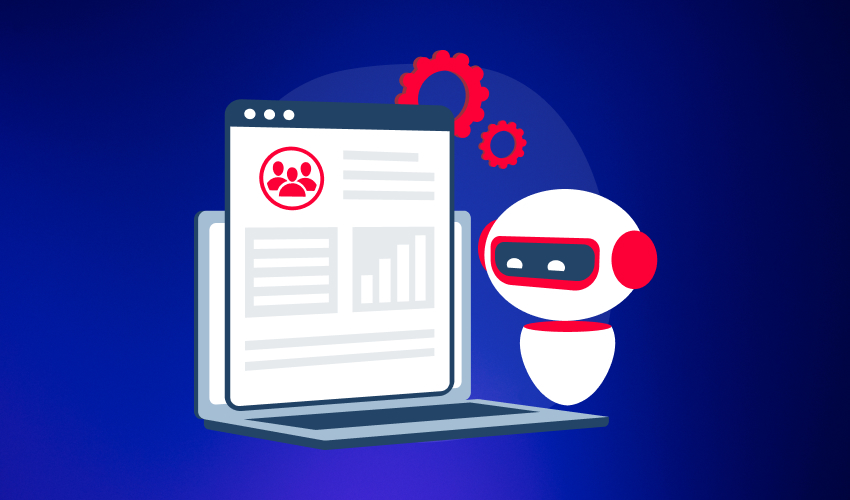Artificial intelligence for content

ChatGPT, Copy.ai, Writesonic and other chatbots capable of generating text are becoming increasingly popular. Artificial intelligence for content creation quickly, in a couple of seconds, gives detailed answers to users' questions. It can also write texts, articles, advertising slogans, and edit content. Companies find many advantages in this, and above all, cost savings. But is everything so rosy in reality? The use of AI in the field of text content generation undoubtedly has pluses, but there are also minuses. We will talk about all of this in this article.
How text content generators work
Any text generator works on the basis of AI technologies, namely machine learning and neural systems. This is quite a complex process, which is somewhat similar to the work of the human brain. It looks like this:
- A huge database is loaded into the system, which includes texts, articles, books, news. This information helps the program learn different writing styles, sentence structure, and grammar;
- The AI platform first learns to understand words, phrases, and then to logically continue the sentences that the user has entered. This allows it to create meaningful responses;
- neural networks analyze semantic connections between words and phrases. Thus, they help the program “understand” not only simple texts, but also complex, abstract ideas;
- when a user enters a question, the chatbot analyzes it, parsing it into small components - identifying keywords, meaning and context to create the desired answer;
- having analyzed the question, the model generates text based on the patterns it has discovered during training. It chooses the most appropriate words and builds coherent sentences to make the answer meaningful.
Thus, modern text content generators can adapt to different tasks - writing articles, advertising slogans or dialogs. This makes them versatile tools for different fields, from marketing to customer service.
What's important to know about content generation
Despite all the achievements of AI generators, there are a number of problems with them that affect the quality, accuracy, reliability of content from AI. Therefore, you should work with the tool carefully and be sure to consider all the nuances.
In what language is it better to write a chatbot?
Most popular text generators, such as ChatGPT, Copy.ai, Writesonic, Typeface, and Jasper, work on the basis of English-language sources. Accordingly, they are best at generating texts in English.
But everything is not so smooth with other languages. ChatGPT and Cloud create content in Ukrainian and Russian best of all. At the same time, the first one is more reliable and accurate, although the text requires revision by specialists.
As for other services, they are still more focused on English-language content. Proposals in other languages often contain errors, grammatical inaccuracies, which leads to the creation of text that seems unnatural and does not attract attention.

Incomplete or incorrect answers
Artificial intelligence for content creation can create compelling texts that contain false information. There are several reasons for this:
- database errors. The system learns from information taken from different sources, including regular websites. AI for content in this case is unable to distinguish facts from misinformation, which causes errors to occur in the generated text;
- The predictive nature of text. AI for text content generation creates sentences by selecting the words and phrases that best follow it. In doing so, it may ignore fact-checking, even if the database is correct;
- Lack of access to up-to-date information. Many text generators work on the basis of information from past months or even years. Therefore, they often do not take into account recent changes and produce outdated information;
- misinterpretation of the question or errors in processing facts often lead to false results.
Companies that care about their image should carefully check the generated content for accuracy. Otherwise, they risk spreading incorrect data, which can lead to loss of trust from customers and partners, deterioration of reputation and even legal consequences.
Creating a content plan - problems with granularity
American company Terakeet studied the ability of AI to create a quality content strategy, and came up with these results:
- ChatGPT, Copy.ai, Writesonic, Typeface, Jasper are able to generate a content plan. But it often lacks the detail to create quality content with SEO in mind;
- text generators are not able to analyze the current positions in search engine results, which negatively affects the quality of content strategy;
Thus, you should not completely rely on the creation of a content plan by chatbots, as the options they present require revision.
Other challenges
To get content noticed by search engines, it's important to get the keywords right. And this is where generators do not do well. They are not always able to naturally fit the phrase into the text and it will look foreign. In addition, chatbots do not know how to evenly distribute the keys, creating overspam in one part and a serious deficit in another. This worsens readability and also negatively impacts SEO, reducing the chances of AI content being successfully promoted in search engines.
Other problems faced by users using AI for content include:
- Uniqueness issues. AI is far from always creating text from scratch. It is often the case that it simply throws the user information from some site;
- links to non-existent resources;
- a problem with the structure - the generator gives the text in a list or without it at all. It can also give a long monotonous description of one fact, without moving on to the next point. Because of this, the text looks formulaic and monotonous;
- improper editing. If there are no real errors in the material, the generator can “invent” them and point them out, creating a false impression of the need for edits. Moreover, sometimes chatbots correct the text incorrectly, which leads to distortion of meaning or deterioration of content quality.
Using AI-generated content in its “pure form” is not a good idea. The errors that generators produce emphasize the importance of human intervention in the process of creating and editing texts. Only in this way will you be able to provide users with interesting, relevant and useful information.
Where to order quality texts for websites
If you need a website with really high quality content, contact IT-company MEGASITE! We develop and effectively promote online products in various niches, from online stores to web applications. Our specialists:
- take into account the peculiarities of your business and target audience;
- use the most modern tools and technologies in development;
- create unique and useful content - articles, blogs, product descriptions, etc...
Order a website with content that really attracts visitors from MEGASITE and be convinced of the effectiveness of our approach!
Your project
Call/write:


